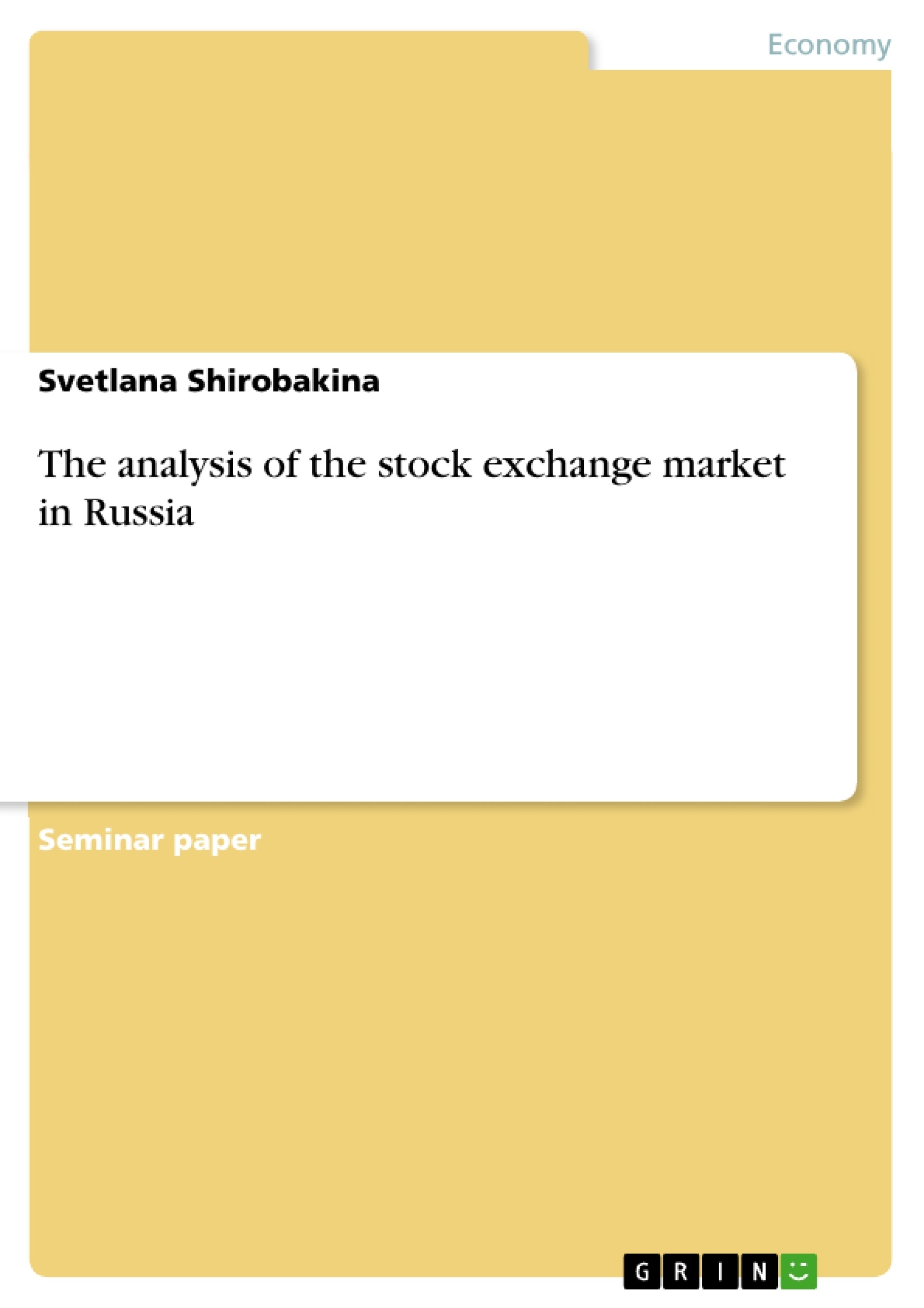The stock exchange market is one of the key mechanisms for attracting monetary ressources for investment, economy modernisation and stimulation of the production growth in a country. At the same time the world stock exchange markets can be a source of financial instability and even of macroeconomic and social shocks. Esspecialy volatible to economic shocks are the stock exchanges of transitional economies, such as Russia, which was characterised as a one of the most risky countries in early 90 ies. The transition of Russia from a plan to a market economy has caused increasing interest to stock exchanges as an important component of the stock market. Russian economists came to conclusion that stock exchange market is the nervous terminations of economy and of all spheres of the life of society. These nervous terminations react to the depth of the processes occuring in an organism, much earlier, than the organism itself. Therefore the stock exchange market is the lead indicator of what will occur in economy. But imperfection of the Russian legislation, absence of culture of corporate management, lacks in system of disclosing information and legal base demanding completion are the basic features of the exchange stock market in Russia. The purpose of my assigment, therefore, is to analyse the current competitive position of Russia on the world stock market, to reveal problems of modern Russian stock exchanges and to find out the reasons of their occurrence. The efficiency of the stock exchange in Russia will be assessed according to the models applied in the financial literature. In order to reach this target first we have to look at the theoretical aspects of the core essence and main functions of stock exchanges.
Inhaltsverzeichnis (Table of Contents)
- INTRODUCTION
- STOCK EXCHANGE MARKET- THEORETICAL ASPECT
- The essense and targets of stock exchanges
- Economic functions of stock exchanges
- The role of stock exchanges in transitional countries
- The assessment of economic efficiency of stock exchange
- ASSESSMENT OF STOCK EXCHANGE MARKET IN RUSSIA
- Origin and development of stock exchange in Russia
- The competitive position of the Russian stock exchange market
- Risks factors in Russia
- Main features of the stock exchanges in Russia
- Exogen factors, influencing stock exchange market in Russia
- Endogen factors, influencing stock exchange market in Russia
- ASSESSMENT OF EFFICIENCY OF STOCK EXCHANGE IN RUSSIA
- CONCLUSION
Zielsetzung und Themenschwerpunkte (Objectives and Key Themes)
This assignment aims to analyse the current competitive position of Russia on the world stock market, identify problems of modern Russian stock exchanges, and determine the reasons for their occurrence. The efficiency of the stock exchange in Russia will be assessed based on models used in financial literature.
- The essence and functions of stock exchanges
- The development and current state of the Russian stock market
- The challenges and risks facing the Russian stock market
- The assessment of the efficiency of the stock exchange in Russia
- The role of stock exchanges in transitional economies
Zusammenfassung der Kapitel (Chapter Summaries)
- Introduction: Introduces the stock exchange market as a key mechanism for attracting investment and economic growth in a country. Highlights the volatility of stock exchanges in transitional economies, particularly in Russia, due to economic shocks and ongoing transition from a planned to a market economy.
- Stock Exchange Market- Theoretical Aspect: Defines the essence and targets of stock exchanges, distinguishing between primary and secondary markets and discussing their interconnectedness. Explains the function of the secondary market in providing liquidity for securities. Differentiates between organized and non-organized stock exchange markets, emphasizing the role of the organized market in influencing price trends in the broader market.
- Assessment of Stock Exchange Market in Russia: Discusses the origins and development of the stock exchange in Russia. Examines the competitive position of the Russian stock exchange market in the global context. Identifies key risk factors in the Russian stock market, including legal complexities, lack of transparency, and insufficient corporate governance. Analyzes the main features and characteristics of the stock exchanges in Russia. Explores both exogenous (external) and endogenous (internal) factors influencing the Russian stock exchange market.
Schlüsselwörter (Keywords)
This work focuses on the analysis of the stock exchange market in Russia, examining its economic functions, development, risks, and efficiency. Key concepts include: stock market, stock exchange, transitional economies, economic shocks, risk factors, liquidity, corporate governance, transparency, investment, economic growth, market efficiency, and financial literature.
Frequently Asked Questions
Why is the stock exchange important for Russia's economy?
The stock exchange is a key mechanism for attracting investment, modernizing the economy, and stimulating production growth during the transition to a market economy.
What are the main problems facing the Russian stock market?
Key challenges include imperfect legislation, a lack of corporate governance culture, and insufficient transparency in information disclosure.
How does the secondary market function in this context?
The secondary market provides liquidity for securities and influences price trends, acting as a "nervous system" that reacts to economic changes before they manifest elsewhere.
What risk factors are specific to transitional economies like Russia?
Transitional economies are highly volatile and susceptible to macroeconomic shocks, legal instability, and financial insecurity.
How is the efficiency of the Russian stock exchange assessed?
Efficiency is evaluated using financial models that analyze both exogenous (external) and endogenous (internal) factors influencing market performance.
- Citar trabajo
- Dipl. Betriebswirtin Svetlana Shirobakina (Autor), 2006, The analysis of the stock exchange market in Russia, Múnich, GRIN Verlag, https://www.grin.com/document/57862



